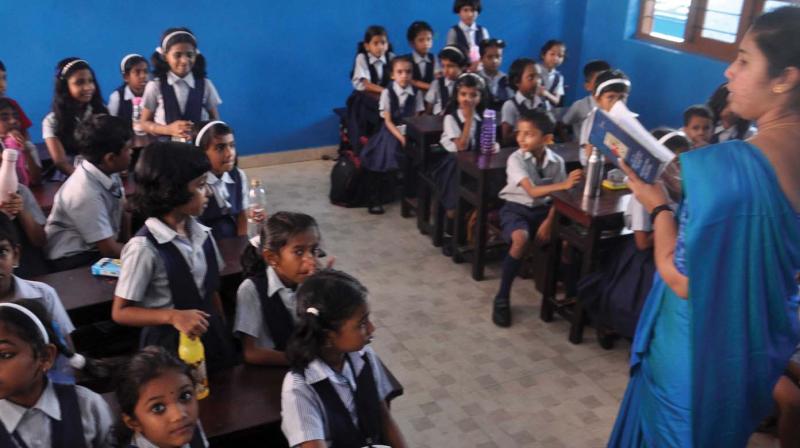Kochi:Less is more for young minds
Teachers, experts, favour HRD move to restrict subjects for Class I, II to languages, mathematics.

Kochi: The Union HRD Ministry which directed schools of different boards not to prescribe home works to students of Class I and II and restrict the weight of school bags of students up to Class X in a recent circular, had a third fiat with it. It directed the different boards to restrict subjects for Classes I and II to maths and language. It also directed that environmental science, languages and mathematics only be taught to students from Class III to V as prescribed NCERT. While science is casualty in Class I and II, social science and pure science won’t be separately taught in Class III to V. DC catches up with experts to find out if this move is in the right direction.
According to Shyni V. Thomas, principal, Global Public School, Cherpu, from the age of 3 to 7, the foundation in languages should be laid.
“As per the psychological approach, by the age of three, a child should have absorbed 2500 words by listening mostly. It is easy for a child in the age group of 3 to 5 to learn a language. This learning process cannot be delayed to start at the age of 7. Science is not important at this age. The study of science is fine to start from Class III. Oral practice is important in the years up to Class II,” said Shiny V Thomas.
She said that the MHRD circular restricting subjects to language, environmental science and mathematics from Class III to V is also in the right direction.
“Teaching social science and science separately at this age group is not necessary. In fact environmental science covers both science and social science. More portions need not be covered at this stage in separate heads,” she said.
According to Dr J. Prasad, Director of State Council of Education Research and Training (SCE-RT-Kerala), the SCERT textbooks are already devised taking into consideration all these aspects. “The language text books for Class I and II have environmental science embedded in it, so it need not be taught separately. In fact students learn about their surroundings first and it automatically comes in the class,” Dr Prasad said.
“Earlier students were first taught letters and then other things. Today a student is shown a picture and then is connected to its name in the form of letters and language which has been found more scientific. Even when a teacher and student sip a cup of coffee, he can teach the student language, mathematics and science connecting it to the activity. So compartmentalisation does not exist in reality and should not exist, especially in the primary and secondary classes. When the student relates what he learnt in classes to his social sphere activity, the real learning takes place,” said Dr J. Prasad.
Eminent psychiatrist and activist Dr C.J. John said that the MHRD circular lacked clarity. “It says only language and does not specify how many languages and does not stipulate the syllabus also,” Dr John said.
“In fact our classrooms need experiential learning from the beginning itself so that the students are able to enjoy as they learn. In such an environment, science automatically comes for reference when a teacher imparts lessons in language. From the early age the imaginative faculties of students should be stirred. The learning environment should not be limited in structures and students should not be suffocated that way,” Dr John said.
“In fact when environmental science is prescribed for Class III to V, both social science and pure science can be brought there and imparted to children. The imaginative teaching skill of the teacher is what it counts. It calls for not compartmentalising subjects, but laying a sound foundation for students. The schools and teachers are to be lot more imaginative to introduce students to concepts of science by exploration and experience,” said Dr C.J. John.
“It will be good if students get more time at school to enjoy childhood and to explore their aptitudes and talents. As such there is syllabus overload at higher classes that make children unable to spend time on their extra academic skills,” Dr John added.

